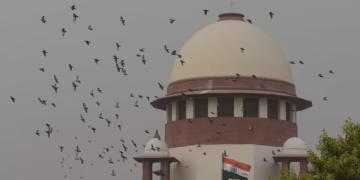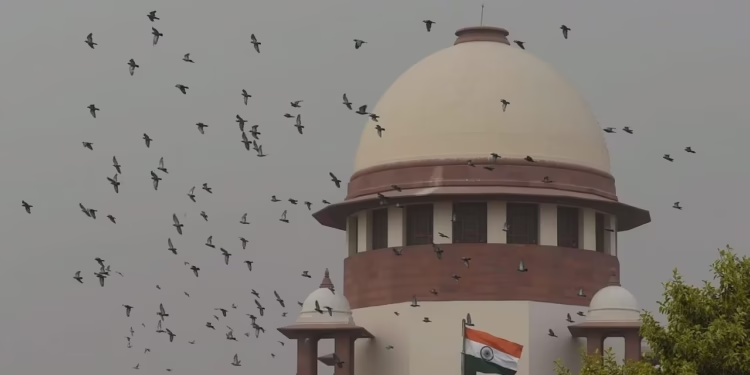The court has recorded the government’s assurance that no appointments will be made to the Waqf Council or Waqf Boards until the matter is reviewed again on May 5.
On Thursday, April 17, 2025, the Union government reassured the Supreme Court that it would refrain from denotifying properties previously declared as waqf by courts until the next hearing scheduled for May 5, 2025.
The case, heard by a Bench led by Chief Justice of India (CJI) Sanjiv Khanna, alongside Justices P.V. Sanjay Kumar and K.V. Viswanathan, pertains to a series of petitions challenging the constitutional validity of the recently passed Waqf (Amendment) Act, 2025.
During the proceedings, Solicitor General Tushar Mehta also assured the court that no appointments would be made to the Central Waqf Council or the State Waqf Boards during the interim period. The Waqf (Amendment) Act, 2025 has sparked controversy due to its provisions allowing the inclusion of non-Muslim members in these key waqf institutions, a move that has faced significant opposition.
The outcome of this case could have far-reaching implications for the governance of waqf properties and the broader legislative framework concerning waqf management in India. The next hearing will determine the direction of the ongoing legal challenge to the Act.
The court granted the Centre one week to respond to the petitions challenging the validity of the controversial Waqf Act amendments. The petitioners have raised concerns about several provisions of the law, including the derecognition of waqf-by-user properties, the inclusion of non-Muslims in waqf administrative bodies, and the state’s authority to alter the status of disputed waqf land.
The petitioners argue that waqfs, which involve the creation, management, and administration of charitable trusts, are an integral part of Islamic practice and should be constitutionally protected. On the other hand, the government has defended the amendments, emphasizing that they are designed to improve transparency and accountability within the waqf system. The matter remains under judicial scrutiny, and the government’s response will be awaited in the coming days.
The law was recently notified by the Centre after it received the assent of President Droupadi Murmu on April 5, 2025. In the Rajya Sabha, the Bill was cleared with 128 votes in favour and 95 against—a narrower margin compared to the Lok Sabha, where it passed with a lead of 56 votes.

Supreme Court Delays Decision on Waqf (Amendment) Act, 2025, Gives Centre a Week to Respond
On Thursday, April 17, the Supreme Court of India refrained from staying the Waqf (Amendment) Act, 2025, and provided the Centre with a week’s time to respond to the ongoing pleas challenging the constitutionality of the legislation.
During the proceedings, Solicitor General Tushar Mehta informed the court that the Centre would file its response within seven days. The Supreme Court also noted that Mehta assured no appointments would be made to the Waqf Council or Board under the new law until further notice.
Previously, on April 16, the court indicated it might consider issuing an interim order to prevent the denotification of Waqf properties by district collectors. This provision, part of the new amendment, empowers a designated officer—potentially a district collector—to decide whether the Waqf Board, which governs Islamic religious endowments, holds legitimate claims over properties under its management.
The matter remains under review, and the Centre is expected to clarify its position by April 24.
The bench, led by Chief Justice of India Sanjiv Khanna, along with Justice K.V. Vishwanathan and Justice Sanjay Kumar, has ruled that the Collector will proceed with the ongoing proceedings, but the proviso in question will not be enforced.
The court will also examine the opposition to the amendment, which permits non-Muslims to be included in the Waqf Board.
Supreme Court’s Stance on Waqf Act: No De-Notification of Waqf Properties
On April 16, 2025, the Supreme Court delivered a significant observation regarding the Waqf Act. The bench emphasized that any properties declared as Waqf by the court, whether by Waqf-by-user, Waqf-by-declaration, or otherwise, will not be de-notified or treated as non-Waqf properties. This applies to properties declared as Waqf by courts or through other means.
Chief Justice of India, Sanjiv Khanna, strongly stated that the government cannot alter history through amendments to the Waqf Act. He referenced the recent amendments which allowed for the de-notification of properties declared as Waqf long ago, stressing that such changes cannot rewrite the past or invalidate the properties’ Waqf status.
This ruling upholds the sanctity of Waqf properties and ensures that those already recognized as Waqf by courts will continue to be treated as such, regardless of the new amendments introduced under the Waqf Act.
The Supreme Court is currently hearing a series of petitions challenging the constitutional validity of the Waqf (Amendment) Act, 2025, recently passed by Parliament. Among those filing petitions is AIMIM leader Asaduddin Owaisi, who is seeking a review of the new legislation.
In addition to Owaisi’s plea, the court will also consider petitions from Aam Aadmi Party leader Amanatullah Khan, the Association for the Protection of Civil Rights, Arshad Madani, Samastha Kerala Jamiathul Ulema, Anjum Kadari, Taiyyab Khan Salmani, Mohammad Shafi, Mohammed Fazlurrahim, and RJD leader Manoj Kumar Jha.
Read Also
Delhi: Woman Fakes Pregnancy for 9 Months, Kidnaps Girl from Safdarjung Hospital – Arrested















 Categories
Categories









